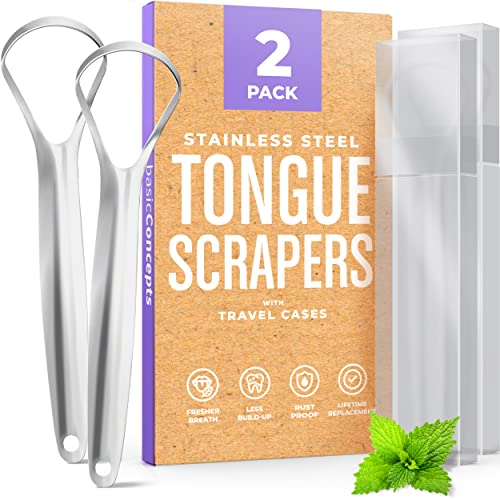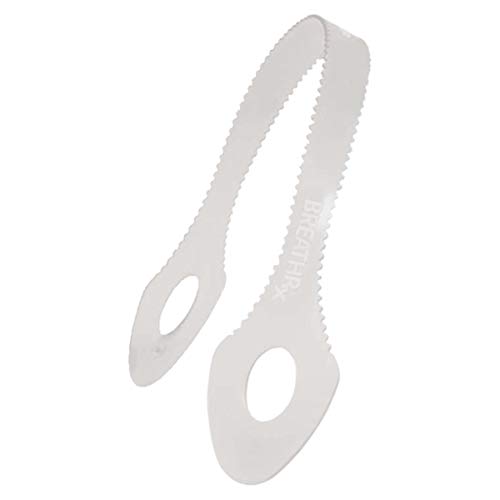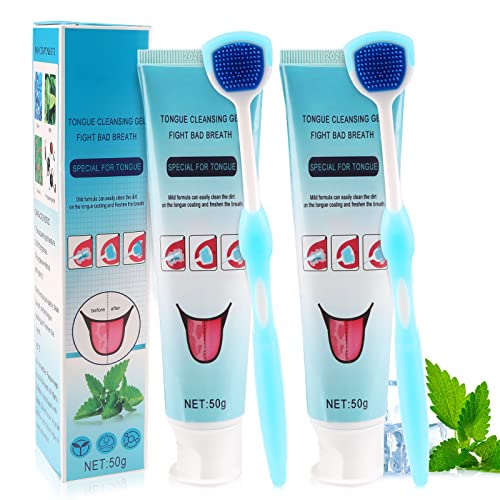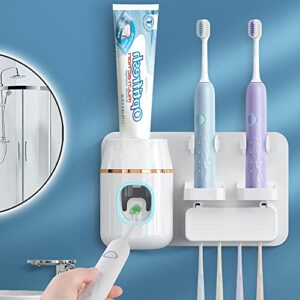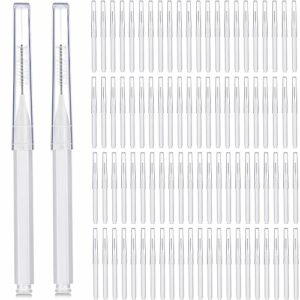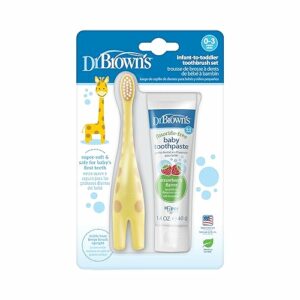Are you tired of waking up with morning breath that could knock out a small army? We’ve all been there. That’s why we’re here to help you choose the best tongue cleaner for fresher breath. We understand the struggle and the embarrassment that comes with bad breath, and we want you to know that you’re not alone. In this post, we’ll dive into the world of tongue cleaners and guide you through the process of finding the perfect one. Say goodbye to bad breath and hello to a fresh and confident smile. Let’s get started!
Keep Your Mouth Clean and Fresh with the Bestselling Tongue Cleaner
Understanding the importance of tongue cleaning
Have you ever wondered why, despite brushing your teeth diligently, you can still experience persistent bad breath? The answer may lie in an often overlooked aspect of oral hygiene: tongue cleaning. In this blog section, we will explore the importance of tongue cleaning for maintaining fresher breath. We will delve into the reasons why bacteria and food particles on the tongue can contribute to bad breath, and why brushing alone may not be enough to combat this issue.
The Role of Bacteria on the Tongue
- Bacteria Breeding Ground:
- The tongue’s surface provides an ideal environment for bacteria to thrive due to its rough texture and warm, moist conditions.
- These bacteria can produce volatile sulfur compounds (VSCs), leading to foul-smelling breath.
- Biofilm Formation:
- Bacteria on the tongue can accumulate and form a thin layer known as a biofilm.
- This biofilm can harbor harmful bacteria and contribute to the production of VSCs.
- Coating and Debris:
- The tongue’s rough surface can accumulate a coating comprised of bacteria, food particles, dead cells, and other debris.
- This coating can contribute significantly to bad breath if not effectively removed.
Inadequacy of Brushing Alone
- Limited Reach:
- Regular toothbrush bristles are not designed to effectively clean the uneven surface of the tongue.
- Brushing alone may only disturb the bacteria and debris, redistributing them rather than removing them entirely.
- Missed Areas:
- The back of the tongue, where a significant portion of odor-causing bacteria reside, is often neglected during routine brushing.
- Neglecting these areas can lead to persistent bad breath.
Benefits of Tongue Cleaning
- Fresher Breath:
- Tongue cleaning removes the biofilm, coating, and debris that contribute to bad breath, resulting in a noticeably fresher breath.
- Enhanced Taste:
- Accumulated debris on the tongue can dull your sense of taste.
- By cleaning your tongue, you can enhance your taste perception and enjoy the flavors of food and beverages more fully.
- Improved Oral Health:
- Removing bacteria and debris from the tongue can help prevent oral health issues such as tooth decay, gum disease, and oral infections.
- Overall Well-Being:
- Maintaining good oral hygiene, including tongue cleaning, can contribute to your overall well-being and confidence.
How to Properly Clean Your Tongue
- Choose a tongue cleaner or scraper that suits your preference (e.g., plastic, metal, or silicone).
- Stand in front of a mirror and extend your tongue.
- Gently scrape the cleaner from the back of your tongue to the front, applying light pressure.
- Rinse the scraper after each stroke to remove the accumulated debris.
- Repeat the process several times until your tongue feels clean.
- Rinse your mouth thoroughly with water or mouthwash.
Different types of tongue cleaners
Maintaining good oral hygiene is essential for overall health, and one area that often gets overlooked is the tongue. By cleaning your tongue regularly, you can eliminate bacteria, food particles, and debris that can lead to bad breath and other oral health issues. In this blog post, we will explore the various types of tongue cleaners available in the market, discussing their pros and cons to help you make an informed decision.
Tongue Scrapers
Pros:
- Effectively removes bacteria and debris from the tongue surface.
- Simple and easy to use.
- Comes in various materials like plastic, stainless steel, and copper.
- Can be easily cleaned and sanitized.
Cons:
- May cause discomfort or gag reflex in some individuals.
- Requires manual dexterity to use effectively.
- May not reach the deeper areas of the tongue.
Tongue scrapers are widely used and have been around for centuries. They typically feature a flat, curved design that allows you to gently scrape the tongue surface, removing bacteria and debris. Here are some popular tongue scrapers in the market:
- Dr. Tung’s Tongue Cleaner
- Orabrush Tongue Cleaner
- GUM Tongue Cleaner
Tongue Brushes
Pros:
- Provides a gentle yet effective cleaning action.
- Can reach deeper areas of the tongue.
- Suitable for individuals who find tongue scrapers uncomfortable.
- Some tongue brushes have additional features like bristles for gum massage.
Cons:
- Requires regular replacement to maintain hygiene.
- Not as widely available as tongue scrapers.
- May not be as effective at removing bacteria and debris as scrapers.
Tongue brushes, similar to toothbrushes, have soft bristles specifically designed for cleaning the tongue. They offer a gentle and efficient cleaning action and can reach deeper areas of the tongue. Here are a few popular tongue brushes on the market:
- Colgate 360° Total Advanced Floss-Tip Bristles Toothbrush (with tongue cleaner)
- DenTek Tongue Cleaner
Tongue Sprays
Pros:
- Convenient and easy to use.
- Provides a quick and refreshing clean feeling.
- Some tongue sprays have additional features like freshening breath or containing natural ingredients.
- Suitable for individuals who find tongue scrapers or brushes uncomfortable.
Cons:
- May not remove bacteria and debris as effectively as scrapers or brushes.
- Requires regular reapplication throughout the day.
- Some tongue sprays may contain artificial ingredients or chemicals.
Tongue sprays offer a quick and convenient way to clean your tongue. They usually come in a compact spray bottle and contain a solution that is sprayed onto the tongue surface. While tongue sprays provide a refreshing feeling, they may not be as effective at removing bacteria and debris as scrapers or brushes. Here are a few popular tongue sprays available:
- TheraBreath Fresh Breath Oral Rinse
- BreathRx Tongue Spray
Factors to consider when choosing a tongue cleaner
Maintaining fresh breath is an important aspect of our daily hygiene routine. While brushing and flossing are crucial for oral health, many people overlook the importance of cleaning their tongue. A tongue cleaner can be a valuable addition to your oral care routine, helping to eliminate bacteria and reduce bad breath. In this article, we will explore several factors to consider when selecting the best tongue cleaner for fresher breath.
Material
The material of the tongue cleaner plays a significant role in its effectiveness and durability. Here are some materials commonly used for tongue cleaners:
- Stainless steel: Tongue cleaners made of stainless steel are highly recommended due to their antibacterial properties and durability.
- Copper: Copper tongue cleaners are also effective in eliminating bacteria and can provide additional health benefits.
- Plastic: While plastic tongue cleaners may be more affordable, they are often less effective at removing bacteria and can deteriorate over time.
Design
The design of a tongue cleaner can greatly impact its ease of use and effectiveness. Here are some design features to consider:
- Shape: Look for a tongue cleaner with a broad and curved shape, as it can cover a larger surface area of the tongue, making the cleaning process more efficient.
- Handles: Tongue cleaners with ergonomic handles provide a comfortable grip, allowing for better control and maneuverability.
- Safety: Some tongue cleaners have safety features, such as a non-gagging design or a protective coating, making them suitable for individuals with a sensitive gag reflex.
Ease of Use
The ease of use of a tongue cleaner is crucial for maintaining a consistent oral care routine. Consider the following factors:
- Size: Choose a tongue cleaner that is easy to handle and maneuver in your mouth. A compact size can make it more convenient for travel.
- Cleaning method: Tongue cleaners can have different cleaning mechanisms, such as scraping, brushing, or a combination of both. Select a method that suits your preference and comfort level.
- Maintenance: Look for a tongue cleaner that is easy to clean and maintain. Some can be washed with water, while others may require additional cleaning solutions.
Effectiveness
The primary purpose of a tongue cleaner is to remove bacteria and reduce bad breath. Consider the following aspects to ensure its effectiveness:
- Surface coverage: A tongue cleaner with a larger surface area can clean more of the tongue in one swipe, making it more effective.
- Bristle type (if applicable): If you opt for a tongue cleaner with bristles, choose one with soft bristles to avoid irritation or discomfort.
- Customer reviews: Reading customer reviews can provide valuable insights into the effectiveness of a particular tongue cleaner.
Tips for Maintaining a Tongue Cleaner
Keeping your tongue cleaner clean and well-maintained is crucial for maintaining good oral hygiene and ensuring its effectiveness in removing bacteria and debris from your tongue. Here are some practical tips to help you properly clean and maintain your tongue cleaner:
1. Proper Storage
Storing your tongue cleaner correctly is the first step in maintaining its cleanliness and longevity. Follow these storage tips to keep it in optimal condition:
- Store your tongue cleaner in a clean and dry place to prevent bacterial growth.
- Consider using a designated container or protective case to keep it away from other oral care tools, reducing the risk of cross-contamination.
- Avoid storing your tongue cleaner in a closed, damp environment, as this can promote the growth of mold and bacteria.
2. Regular Cleaning
Regularly cleaning your tongue cleaner is essential to prevent the buildup of bacteria and ensure its effectiveness in cleaning your tongue. Here’s how to clean it properly:
- After each use, rinse your tongue cleaner under running water to remove debris and saliva.
- Use a mild antibacterial soap or toothpaste to clean the bristles or scraping surface of your tongue cleaner.
- Gently scrub the entire surface of the cleaner with a toothbrush or your fingers to dislodge any remaining debris.
- Rinse thoroughly to remove all traces of soap or toothpaste.
3. Disinfection
Disinfecting your tongue cleaner periodically helps eliminate bacteria and prevent the spread of oral infections. Consider the following disinfection methods:
- Soak your tongue cleaner in an antimicrobial solution like mouthwash or diluted hydrogen peroxide. Follow the instructions on the product for the appropriate dilution ratio and soaking time.
- Another option is using boiling water to sterilize your tongue cleaner. Place it in a pot of boiling water for a few minutes, then remove and let it cool before use.
4. Replacement Timeframe
Just like any other oral care tool, tongue cleaners have a limited lifespan. To ensure optimal performance and hygiene, it’s important to replace your tongue cleaner at the right time. Here are some indicators that it’s time for a replacement:
- Visible signs of wear and tear, such as bent or frayed bristles.
- Discoloration or staining that cannot be removed through cleaning.
- An unpleasant odor that persists even after thorough cleaning.
- If you’ve been sick or have had an oral infection, it’s advisable to replace your tongue cleaner to prevent reinfection.
By following these maintenance tips, you can ensure that your tongue cleaner remains effective, hygienic, and safe to use. Remember, a clean tongue not only contributes to fresher breath but also reduces the risk of oral health issues. So, make tongue cleaning a part of your daily oral hygiene routine for a healthier mouth and a confident smile!
Making the Right Choice for a Breath of Fresh Air
In conclusion, we have discussed the importance of tongue cleaning for achieving fresher breath and maintaining oral health. We highlighted the factors to consider when choosing the best tongue cleaner, such as effectiveness, ease of use, and durability.
Incorporating tongue cleaning into our daily oral hygiene routines is crucial in order to remove bacteria and debris from the tongue, which can contribute to bad breath. By doing so, we can enhance our overall oral health and enjoy the confidence of fresh breath throughout the day.
Based on these factors, our top recommendation for the best tongue cleaner is [insert name of product]. This tongue cleaner combines effectiveness in removing bacteria and debris, ease of use with its ergonomic design, and durability for long-lasting use. We believe that incorporating this tongue cleaner into your daily oral hygiene routine will greatly contribute to fresher breath and a healthier mouth.
Remember, choosing the right tongue cleaner is essential, but consistency is key. By making tongue cleaning a regular part of our oral care routine, we can achieve the best results and enjoy the benefits of fresher breath. So, invest in a quality tongue cleaner and start enjoying the benefits of a cleaner, fresher mouth today!


